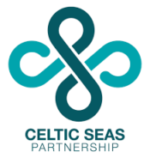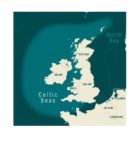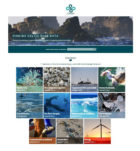
Information Portal for the Celtic Seas – helping users find Marine Strategy Framework Directive (MSFD) relevant data and information
The Celtic Seas Partnership (CSP) project, a 4-year project part funded by EU LIFE+, ended in March 2017. WWF-UK was the lead with partners the Natural Environment Research Council, SeaWeb Europe, the University of Liverpool and the Eastern and Midland Regional Assembly in Ireland. The project’s aim was to draw people together from across the Celtic Seas to set up collaborative and innovative approaches to managing their marine environment.
 The Celtic Seas, designated as one of the MSFD regions, includes parts of the open Atlantic west of Ireland and Scotland, shallow seas surrounded by land in the Irish Sea and west of Scotland, numerous sea lochs, and large estuaries like the Shannon, Severn and Solway Firth.
The Celtic Seas, designated as one of the MSFD regions, includes parts of the open Atlantic west of Ireland and Scotland, shallow seas surrounded by land in the Irish Sea and west of Scotland, numerous sea lochs, and large estuaries like the Shannon, Severn and Solway Firth.
A key output of the Partnership has been the development of a web-based information portal by the British Oceanographic Data Centre (BODC) to provide access to data, metadata and documentation specifically relating to the MSFD.
The information portal comprises two parts:
- a data catalogue for users to find datasets relevant to the 11 MSFD Descriptors and
- a resource library for MSFD related websites, articles and reports
The data catalogue is a signposting service providing the user with links to 363 discovery metadata records plus links to view and download services where these are available.
 For ease of discovery, datasets are grouped by Descriptor and on each Descriptor page by MSFD Criteria and Indicator (based on the EC 2010 Commission Descriptor Decision). The user can also filter on country of origin and where datasets are formally used as a member states’ MSFD assessment. For the most part, the latter information is not in the public domain so this information is unknown for many datasets. For those users not interested in MSFD, the data catalogue still provides an easily searchable tool for finding data sets for the Celtic Seas region.
For ease of discovery, datasets are grouped by Descriptor and on each Descriptor page by MSFD Criteria and Indicator (based on the EC 2010 Commission Descriptor Decision). The user can also filter on country of origin and where datasets are formally used as a member states’ MSFD assessment. For the most part, the latter information is not in the public domain so this information is unknown for many datasets. For those users not interested in MSFD, the data catalogue still provides an easily searchable tool for finding data sets for the Celtic Seas region.
The resource library area provides access to 283 websites, reports and articles relevant to MSFD and the Celtic Seas and a suite of filters allow easy searching of the catalogue.
The Information Portal is built on Linked Data
We have used a Linked Data approach to expose the content of the two metadata databases via a SPARQL endpoint so that SPARQL queries can be used to retrieve the metadata held in the data catalogue and resource library databases directly. Linked data is the current recommended best practice for exposing, sharing, and connecting pieces of data, information, and knowledge on the Semantic Web using URIs. By exposing the metadata in this way, the content has become part of the Web of Data, meaning that it is freely discoverable and usable by any third part application. It also underline’s BODC’s aim to make as much of its data as possible rated as 5*. The star system for data refers to how accessible and open (i.e. free to reuse) the data are, and is promoted by the UK’s Cabinet Office. Various initiatives, such as the data.gov.uk portal, are designed to help organisations increase the * rating of the data that they hold. As this is still a relatively novel way to expose metadata, particularly in the environmental sciences, we have presented the technical development work as a poster at two international conferences and as an oral presentation at the International Conference on Marine Data and Information Systems.
For further information and to answer any questions, please email Gaynor Evans, gaev@bodc.ac.uk

Celtic Seas Partnership EU LIFE+ project LIFE11/ENV/UK/392